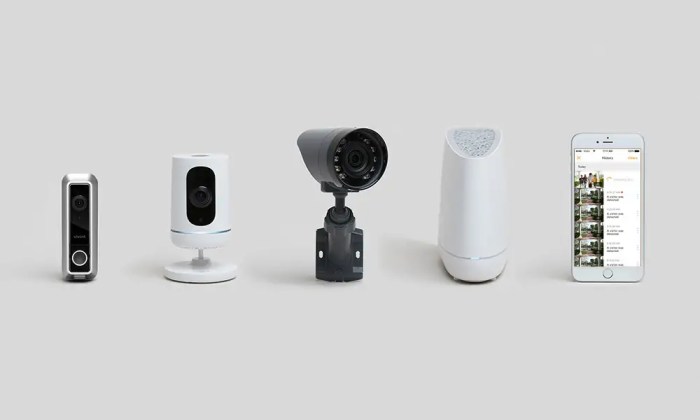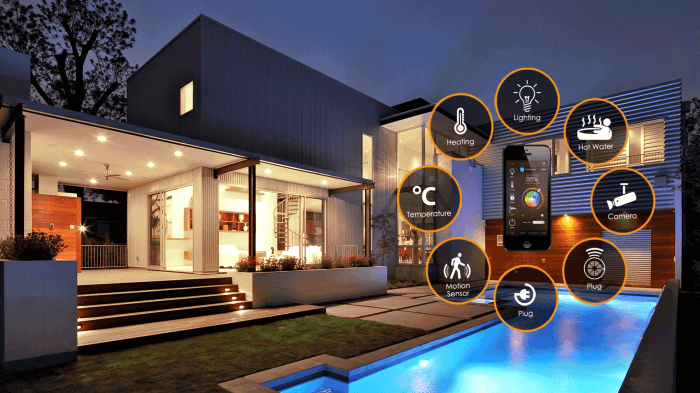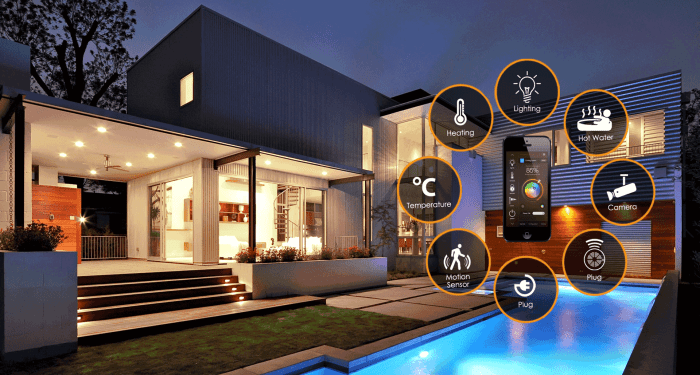Exploring the realm of Best Home Automation and Security Systems for 2025, this introduction aims to captivate readers with a glimpse into the future of smart living. From the evolution of home automation to the latest trends and top devices, this overview sets the stage for an informative journey ahead.
As we delve deeper into the intricacies of home automation and security systems, a world of innovation and technological advancement unfolds before us.
Overview of Home Automation Systems
Home automation refers to the use of technology to control and automate household appliances and systems. Over the years, home automation has evolved from simple remote controls to sophisticated systems that can be managed remotely via smartphones or voice commands.
Key Components of a Home Automation System
- Sensors: These devices detect changes in the environment, such as motion, light, or temperature, and trigger actions accordingly.
- Actuators: Actuators are responsible for carrying out the actions triggered by the sensors, such as turning on lights or adjusting the thermostat.
- Controller: The central hub of the home automation system that processes information from sensors and sends commands to actuators.
- Connectivity: Home automation systems rely on wireless or wired connections to communicate between devices and with the user.
Benefits of Integrating Home Automation in Households
- Convenience: Home automation allows users to control various aspects of their homes with ease, such as adjusting lighting or setting the thermostat, all from a single interface.
- Energy Efficiency: By automating systems like heating, cooling, and lighting, homeowners can optimize energy usage and reduce utility bills.
- Security: Home automation systems often include security features like smart locks, cameras, and motion sensors, enhancing the overall safety of the household.
- Remote Monitoring: With home automation, users can monitor their homes remotely, receiving alerts and notifications about potential issues or emergencies.
Trends in Home Automation and Security Systems

As we look towards the future of home automation and security systems, several key trends are shaping the industry. Advancements in technology have paved the way for more sophisticated and integrated systems, with AI and machine learning playing a significant role in driving innovation.
Integration of Smart Devices
The trend towards integrating various smart devices within a home automation system is becoming increasingly popular. From smart thermostats and lighting systems to security cameras and door locks, homeowners are looking for seamless connectivity and control over their devices.
Voice Control Technology
Voice control technology has seen significant advancements in recent years, allowing users to control their smart devices through voice commands. This trend is expected to continue growing, providing users with a hands-free and convenient way to manage their home automation systems.
Enhanced Security Features
Security remains a top priority for homeowners, leading to the development of more advanced security features in home automation systems. Predictive analytics, facial recognition technology, and real-time alerts are some of the features that are gaining popularity to enhance home security.
Energy Efficiency Solutions
With a growing focus on sustainability, home automation systems are incorporating energy-efficient solutions to help homeowners reduce their carbon footprint. Smart energy monitoring, automated lighting controls, and smart appliances are some of the ways technology is being used to promote energy efficiency.
Personalized Experiences
AI and machine learning are driving the trend towards personalized experiences in home automation systems. These technologies analyze user behavior and preferences to tailor settings and routines, creating a more customized and intuitive smart home environment.
Best Home Automation Devices for 2025
In 2025, the market is filled with advanced home automation devices that offer enhanced convenience and security to households. These devices are designed to seamlessly integrate into existing smart home ecosystems, providing users with a comprehensive solution for managing their homes efficiently.
1. Smart Thermostats
Smart thermostats are one of the top home automation devices for 2025. These devices allow homeowners to control the temperature of their homes remotely, saving energy and reducing utility costs. They can also learn the household's heating and cooling patterns to optimize comfort and efficiency.
2. Smart Door Locks
Smart door locks are essential for enhancing home security in 2025. These devices enable keyless entry, remote access control, and activity monitoring. Homeowners can grant access to guests or service providers through temporary digital keys, ensuring the safety of their homes.
3. Home Security Cameras
Home security cameras have evolved significantly by 2025, offering high-definition video recording, motion detection, and two-way audio communication. These cameras provide real-time monitoring of the property, deterring potential intruders and allowing homeowners to keep an eye on their homes from anywhere.
4. Smart Lighting Systems
Smart lighting systems are popular in 2025 for their energy efficiency and customization options. These devices allow users to adjust the brightness, color, and scheduling of lights remotely
5. Smart Smoke Detectors
Smart smoke detectors are crucial for early fire detection and safety in homes. These devices can send alerts to homeowners' smartphones in case of smoke or fire, allowing for a quick response even when they are away. Some models also include carbon monoxide detection for added protection.
6. Smart Plugs
Smart plugs are versatile devices that can convert traditional appliances into smart ones. By connecting appliances to smart plugs, users can control them remotely, set schedules, and monitor energy usage. This not only adds convenience but also contributes to energy savings.
7. Smart Home Hubs
Smart home hubs act as the central control point for all connected devices in a smart home ecosystem. These hubs enable seamless communication between different devices, allowing users to create customized automation routines and control multiple devices with a single command.Overall, the best home automation devices for 2025 offer a combination of convenience, security, and energy efficiency.
By integrating these devices into their homes, homeowners can create a smart living environment that enhances their quality of life and peace of mind.
Integration of Security Systems in Home Automation
Integrating security systems with home automation is crucial for ensuring the safety and protection of modern homes. By combining security features with smart technology, homeowners can have greater control and visibility over their property, even when they are away.
Security Cameras in Home Automation
Security cameras play a vital role in home automation by providing real-time video monitoring of the property. These cameras can be accessed remotely through a smartphone or tablet, allowing homeowners to keep an eye on their home at all times.
In case of any suspicious activity, alerts can be sent to the homeowner's device, enabling immediate action to be taken.
Smart Locks for Enhanced Security
Smart locks offer convenient and secure access to homes by allowing keyless entry through PIN codes, biometric scans, or smartphone apps. These locks can be integrated into the home automation system to provide added security features, such as automatically locking doors when the homeowner leaves or unlocking them upon arrival.
Alarms and Sensors for Intrusion Detection
Alarm systems and sensors are essential components of home automation security. These devices can detect unauthorized entry, motion, or environmental changes within the property and trigger alarms or notifications to alert the homeowner. Integration with home automation allows for automated responses, such as turning on lights or sounding alarms in case of a security breach.
Role of IoT in Enhancing Security
The Internet of Things (IoT) plays a significant role in enhancing security features for homeowners by connecting various devices and systems within the home. IoT-enabled security devices can communicate with each other and the homeowner's smartphone, creating a seamless and interconnected network that enhances overall security and surveillance capabilities.
Considerations for Choosing Home Automation Systems
When selecting a home automation and security system, there are several key factors to consider to ensure you choose the right system for your needs.
Features, Reliability, and User Reviews
- Look for systems with a wide range of features that cater to your specific requirements, such as smart lighting, thermostat control, security cameras, and more.
- Consider the reliability of the system, including the technology used, the brand reputation, and the warranty offered.
- Read user reviews to get real feedback from customers who have used the system, highlighting both positive and negative aspects.
Scalability and Customization Options
- Check if the system is scalable, allowing you to easily add more devices or expand the system as your needs grow.
- Look for systems that offer customization options, so you can tailor the settings and automation routines to suit your preferences and lifestyle.
- Consider compatibility with other smart devices and platforms to ensure seamless integration with your existing technology ecosystem.
Wrap-Up

In conclusion, the landscape of home automation and security systems for 2025 is a promising one, offering unparalleled convenience and peace of mind to homeowners. With cutting-edge devices and seamless integration, the future of smart living is brighter than ever.
User Queries
What are the key components of a home automation system?
The key components typically include smart hubs, sensors, actuators, and a control interface to manage connected devices.
How do AI and machine learning impact the future of home automation?
AI and machine learning enable smart systems to learn user preferences, adapt to routines, and enhance overall efficiency and security within a smart home environment.
What factors should be considered when choosing a home automation system?
Factors such as compatibility with existing devices, scalability for future expansions, reliability, and user reviews play a crucial role in selecting the right home automation system.







